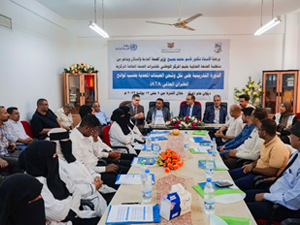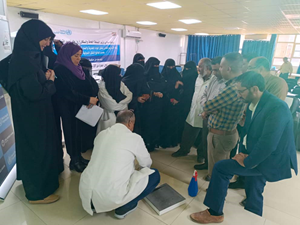 Transport and shipment of potentially infectious substances represents a significant challenge to many countries in the Eastern Mediterranean Region (EMR), due to several reasons such as limited numbers of trained and certified laboratory professionals, few certified instructors, shortage in shipment containers, logistics to obtain the required permits, and other reasons.
Transport and shipment of potentially infectious substances represents a significant challenge to many countries in the Eastern Mediterranean Region (EMR), due to several reasons such as limited numbers of trained and certified laboratory professionals, few certified instructors, shortage in shipment containers, logistics to obtain the required permits, and other reasons.
To address this gap, the WHO EMRO worked on preparing regional certified instructors, in collaboration with the International Air Transport Association (IATA), to be able to provide adapted training to the national context on the IATA regulations on the shipping of infectious substances by air; a regional expert attended a train of trainer workshop in December 2022, to prepare certified trainers on shipment of Dangerous Goods (DG) and was awarded a certification as a recognized instructor
In Yemen, the Infectious Hazard Prevention and Preparedness (IHP) unit of the WHO EMRO carried out a laboratory-focused mission to Aden, Yemen in May 2023, to provide bacterial metagenomics training for High-Threat Pathogens (HTP), and to develop a national work plan for Arboviral, Viral Hemorrhagic Fever (VHF), and Acute Watery Diarrhea (AWD) diseases (LINK HERE: https://www.emro.who.int/pandemic-epidemic-diseases/news/who-builds-surveillance-and-laboratory-capacity-on-high-threat-pathogens-and-genomic-sequencing-in-yemen.html ).
Joint discussions with Ministry of Health officials, Central Public Health (CPHL), Aden, and the laboratory team of the WHO Country Office in Yemen resulted in holding two training workshops on the shipping of infectious substances in line with international regulations, the first in Aden between 9 to 13 July 2023, and the second in Sanaa from 27 – 31 August 2023.
WHO organized the two trainings at the CPHL facilities in both Aden and Sanaa, for eighteen national laboratory professionals (eight females and ten males) and fifteen national laboratory professionals (nine females, and six males), respectively.
The 5-day training covered both theoretical and practical components; Hands-on practical training on the IATA Dangerous Goods Regulations (DGR) manual which helps participants to correctly identify, classify, pack, label, and document infectious substances, and prepare them to transport by air in compliance with the applicable regulations.
 An outline of the training courses includes:
An outline of the training courses includes:
1. Introduction to IATA regulations: Participants were provided with an overview of the regulations and their significance in preventing the spread of infectious diseases.
2. Classification of infectious substances: classification covering criteria determining the appropriate shipping category, detailing the nine categories of infectious substances and their associated risks.
3. Packaging requirements: including types of packaging materials, maximum capacity, and labeling requirements.
4. Shipping documentation: Participants were trained on the shipping documentation requirements, including the Dangerous Goods Declaration (DGD) and the Shipper's Declaration for Dangerous Goods (SDGD).
5. Security awareness: covering proper package handling and applicable biosecurity measures.
Participants were subject to a competency assessment by the end of the training, to evaluate their theoretical and practical skills and knowledge. Eleven out of the eighteen participants (11/18) 61% and, seven out of fifteen (7/15) 47% of participants successfully passed the examination and received the certificate of training completion in the Aden and Sanaa workshops respectively.
The certified national professionals in Aden and Sanaa, Yemen, will be able to safely handle potentially dangerous goods and properly ship infectious substances by air according to IATA regulations.
WHO/EMRO will continue supporting Member States to enhance their laboratory capacity including proper biosafety and biosecurity measures, and to augment the competency of national laboratory professionals.




